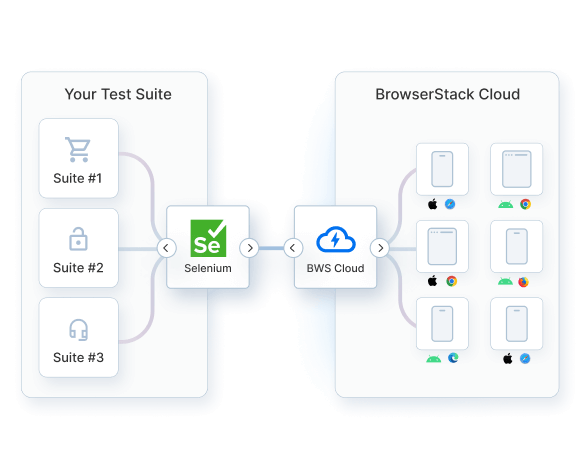Selenium for Mobile Testing
Run Selenium tests on Real Mobile Devices on the Cloud. Test your websites on the latest mobile devices.

Trusted by more than 50,000 customers globally
Features
Real devices and browsers
Harness our Selenium grid to start testing instantly on 3000+ real mobile devices and desktop browsers.
Parallel test runs
Run hundreds of tests concurrently to speed up the execution time of your test suite by more than 10x.
Seamless integration
Integrate in minutes using popular languages and frameworks. Add BrowserStack to your build pipeline using our CI plugins.
Test on dev environment
Test websites hosted on development environments or behind firewalls with zero setup or configuration.
Comprehensive debugging
Debug with ease using video recordings, automated screenshots of errors, text logs, console logs and network logs.
Security & Privacy
Tests run securely on tamper-proof physical devices and desktop VMs, wiped clean of data after every session. Read more about security.
Stories from our customers

Brian Lucas
Senior Staff Software Engineer
Optimizely lowers developer pain by moving testing to the cloud

Priyanka Halder
Sr. Manager Quality Engineering
GoodRx cuts testing time by 90% to release 15 times a day

Kateryna Glushchuk
Senior Product Manager
OLX delivers seamless experiences for a localized global audience

Martin Schneider
Delivery Manager
Asia’s largest classified marketplace uses BrowserStack to scale automation

Srividya Jayaram
Test Engineering Manager
Sainsbury’s leverages test automation to double release frequency

Hyunoo Park
Full Stack Engineer
Legal discovery platform Logikcull reduces test time by 73%
Frequently Asked Questions
Yes, Selenium can be used for web testing on mobile browsers. However, you can test mobile apps on Selenium-based frameworks like Appium or Selendroid.
Specifically, Selenium itself is not designed for testing native mobile apps, but it can be used for automating mobile web apps on mobile browsers.
Testing websites on real mobile devices helps teams identify any bugs that an end-user might encounter in the real world. This ensures that apps and websites are thoroughly tested and can provide a flawless user experience.
Yes, BrowserStack’s real device cloud allows individual QAs and teams to run automated tests on mobile browsers as well as mobile apps on real Android and iOS devices. However, different tools are required for testing apps and websites.
For testing websites, one needs to use automated Selenium testing on real mobile devices. For mobile app testing, use automated app testing with Appium.
As mentioned earlier, Appium can be used in combination with Selenium WebDriver as it uses the same WebDriver API. Thus, for developers or QAs with prior test experience in WebDriver, it is easy enough to use Appium for mobile testing using Selenium scripts.
Refer to this Selenium documentation to get started with automated testing on real iOS or Android devices on BrowserStack.
As mentioned earlier, Selenium is used in combination with the Appium server to drive browser automation tests on mobile devices. At a high level:
- The Appium server uses the JSON wire protocol to accept test commands from the Client in the form of an HTTP restful request.
- Based on the Desired Capabilities configured, the Appium server executes these commands on specific mobile platforms using native automation drivers (For e.g. XCUITest for iOS, and UI Automator for Android).
Yes. Selenium is used to automate web browsers. It is primarily used for cross-browser testing of web applications. Appium, on the other hand, is mainly used for automating tests for native, hybrid, and mobile web apps on mobile devices. In particular, Appium is a highly preferred framework because it supports automation for both iOS and Android operating systems.
Selenium is a widely used tool for automating web-browsers. Its intuitive API and compatibility with multiple client libraries make cross-browser testing very easy for teams.
Appium derives its roots from Selenium and uses the same WebDriver API for driving mobile browsers on Android and iOS. Thus, Appium makes mobile testing using Selenium WebDriver easier for teams or individuals who have prior experience working with Selenium.
BrowserStack’s Cloud Selenium Grid empowers teams with the ability to conduct parallel testing on desired mobile devices (Android or iOS) and browsers. Once a developer or a QA signs up on BrowserStack, they can instantly start testing on a variety of desired mobile-browser combinations.
Additionally, BrowserStack also provides integrations with popular frameworks like Appium, Selenium, XCUITest, Espresso. This ensures that testers have a comprehensive mobile testing experience on the platform.
